|
Introduction by Jim Liddane
Terry Noon is one of those rare creatures - a publisher who has spanned four decades in the British rock industry - and who played drums for Gene Vincent and was a member of Them, backing Van Morrison.
But when legendary manager Peter Grant fixed him up with a job in music publishing, he took it.
And so began the career of Terry Noon - music publisher extraordinaire, and one of the most respected people in UK music publishing.
Gerald Mahlowe interviewed Terry Noon for the International Songwriters Association's publication "Songwriter Magazine".
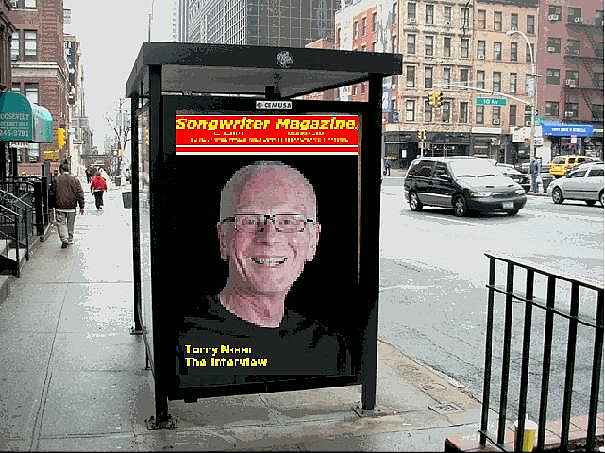
Before your first job in publishing, had you learned anything about that aspect of the music business?
I once had a song published but I was so naive, I didn't know if I was entitled to any money from it, although I presumed I was. The guy I signed it to told me it was going to be in a film, and I thought this was fantastic. But I never heard anything about it again.
It was a very well known agent, in fact, who had publishing as a small time thing, who obviously knew there was money there, but I don't think the person concerned is in the music business any more.
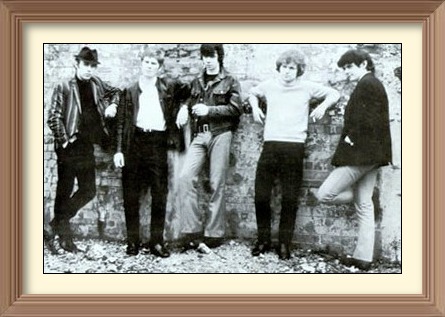
Them 1975: From left: Joe Baldi, Terry Noon,
Peter Bardens, Van Morrison and Alan Henderson
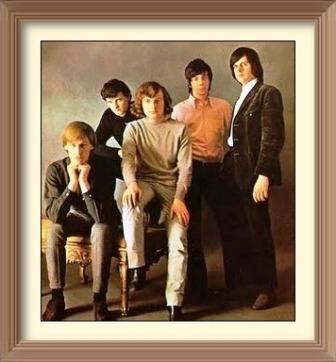
Them 1976, featuring Terry Noon
According to your book, you started work with Ambassador Music but resigned pretty quickly. What happened?
I remember the first day, walking in and seeing a large table, and on it were boxes full of what I presumed were records. But they weren't: they were demo discs. And my boss Lee Pincus said, "These are our songs. What you have to do is to get them recorded by major artists, that's how we earn our money". They were mainly from America, because this was the British branch of an American company, and there must have been about 300 of them, all in alphabetical order.
So I remember picking out the first one, playing it, and it was awful. And Lee said, "Get to know them and then make some appointments". And I thought, "Who do I see?" Luckily there was a guy there named John Beecher who saw my predicament and helped me with a few suggestions. And I think the first person I saw was Tony Hatch, who was fine. He listened to ten songs and said he'd hold one, and then I went round and saw a few other people, but I just didn't get into it at all.
And Lee also said, "Go up to the BBC and get some airplay on the records we have out", and again I didn't know what to do. I remember going to the BBC and trying to plug songs and I got nowhere, and I thought, "This is not for me". I wasn't being lazy, I just didn't know what to do and I wasn't learning. So I left
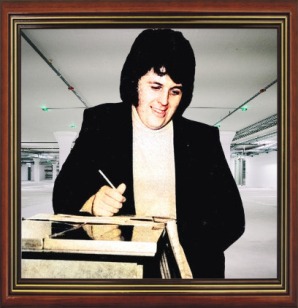
Terry Noon
But still you went back?
I think Lee was a bit shocked I'd left, and he called me up and said, "Give it another try". And I said, "I'm not coming back as a run-around - I want to learn," and Lee said, "OK". But I remember going in the following Monday and falling over these suitcases as I walked in the door, and Lee was saying, "John Beecher is now looking after copyright, you're the General Manager, come with me to the airport and I'll tell you what I think you should do". Lee threw me in at the deep end, and went off to America.
It must have worked because you soon published a huge hit. Tell me about "I Can't Let Maggie Go".
I used to drum with a band called Steve Derbyshire & The Yum Yum Band at a very "in" club in Oxford Street called Tiles, where we had a tremendous following. Anyway, I eventually left, to be replaced by Peter Kircher (who later joined Status Quo by the way), and they changed their name to Honeybus: and Pete Dello said, "I'll write material for the group if you manage them".
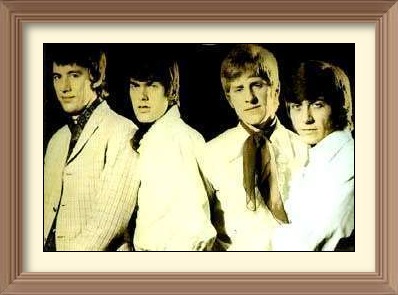
Honeybus
Who got them the record deal?
I got them a deal with Decca through Dick Rowe, who heard some demos and liked the and we had several records out, including "Do I Figure Your Life?", a beautiful song by Pete, which was signed Apollo Music. A lot of people liked that record, it got quite a lot of airplay, and the song received a lot of interest from America. Now by the time started my second stint with Ambassador and within a couple of months, the Honeybus record took off in England in a big way.
In America, much to my annoyance, there were at least two cover versions out, after I'd thought we'd agreed to go with the Honeybus version. But the American company thought that English groups didn't mean anything any more - they'd had the Beatle boom and thought that was it. And the song died a death over there, because nobody worked on it.
But the Pincus family suddenly thought, "this guy can spot talent", because apart from the success over here, we had a very big hit in Holland and Germany. and I was busily taking the group over there as their manager, while also acting as publisher. Later, with the help of John Beecher, I negotiated the Nimble Bread advert, which became one of the longest running advertisements on TV.
How did that come about?
That started with the advertising company, I think it was J Walter Thompson, ringing up and saying they wanted to use "Maggie on an advert, and in fact, they also wanted Honeybus to sing on it. I was wearing two hats of course: I did a deal for them to use the song, but as the group's manager, I consulted with the boys, and we decided that they would not sing on it.
Honeybus used to regard themselves as a very "in" band: they used to do "Top Gear" every other Sunday with John Peel, they were one of the first rock bands to use a string quartet, and they wanted to keep that image of being something special
Was Ambassador a big catalogue?
It had songs like "A Taste Of Honey", and in America quite a few Beatles' songs too, things like "Please Please Me". In fact, I think at one stage, they had four Beatles' records in the Top 10 in America.
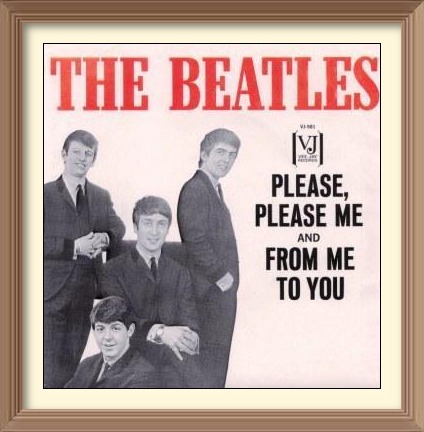
George Pincus, the American owner, was a very old style music publisher, one of the greats, a tremendous hustler, who knew everybody in America. He was very "American", very friendly always cracking jokes, giving people cigars and sweets grabbing people by the lapel. and hugging them. He's dead now unfortunately. but he was quite a guy.
Did you visit Amrica while with Ambassador?
I went on a couple of appointments with George, and I also met Lee's brother, Irwin, and I learned a lot watching the way those two guys operated: they' were both tremendous music men. I realised that it didn't pay to be too laid back, like the English. You had to believe in your product, or at least look as if you believed in it.
You had to convince a producer, say, that he was recording the best possible tune he could get hold of at the time. With Lee, I hadn't quite seen that. Lee himself was very laid back; in fact, I don't think he was that keen on the music business.
Was it your brief to find new English talent, or simply to push the songs that originated in America?
I was urged to find talent in Britain, but I was also questioned on why I wasn't getting covers on American product, so I got the stick from both ends.
Did you have any more successes with Honeybus?
We were hoping that they'd go on to really big things, but Pete Dello unfortunately decided to leave the band just after "Maggie". He decided he couldn't really be a "pop star" as it were, and Honeybus stayed around, though not so successfully. I was still managing them when I was offered a new job.
How did that come up?
I'd stayed very good friends with Pete Dello, and about a year after "Maggie" he brought me a song called "I'm A Gambler". I loved it and said, "Let me try to place the record". I took it to a couple of companies and they showed interest, but then I took it to Larry Page, who had Page One Records (in partnership with Dick James, the music publisher), and Larry loved it and said "You've got a deal".
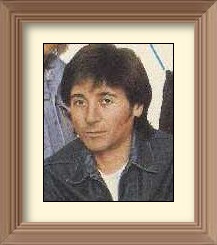
Pete Dello
So be brought the record out, and I think Larry was very impressed because we got quite a lot of airplay, and with the help of a girl named Lisa Denton, a great deal of publicity, which was amazing, because there was actually no group involved, it was just Pete Dello and session musicians. Then Larry called me one day and said he was leaving Dick James to set up on his own. "I'm getting my own record company, Penny Farthing, and I'd like you to be managing director of the publishing company" he said. And at first, I said "No".
Were you unhappy at Ambassador?
No, I was in a fairly good situation. Honeybus were dwindling in terms of fame and fortune, but they were still gigging three nights a week and picking up good money, and so was I as their manager, not to mention my job with Pincus. But the second time Larry asked me, I didn't actually say "no", and then I went to have dinner with him and his wife. He said, "I know you're half way to saying yes, and I hope you do because I've given the story to Music Week", which was all I needed. I just needed that push. So I said "fine" and gave Ambassador a month's notice. George Pincus was very upset but Lee was very nice about the whole thing. And I started with Larry in Tilney Street, Mayfair.
What difference was there from working with Ambassaor?
When I worked for Ambassador, everything was set up already. It was a limited company, they were members of the PRS and MCPS, and to be honest with you, as General Manager, I didn't know too much about all that. I didn't even know what MCPS stood for.
But with Larry, he was saying to me, "You set the whole thing up". Luckily, I had a very good secretary, a very keen young lady, and together we went through all the books, phoned everyone, and gradually started the company from scratch. Again, I'd been thrown in at the deep end.
Again, success came pretty quickly.
Yes. On the Tuesday of my second week with Larry, I went to Holland with Honeybus.
Although they weren't really together as a band, they were still meeting their commitment with Decca to put out singles, and the original members, minus Pete Dello of course, and I, went out there to do their top TV show, "Top Pops".
And I remember we routined the whole thing in the morning, went downstairs for lunch, and this group came on the TV monitor. Now the sound was off, but I remember seeing this beautiful girl singer wearing very little clothing....and all the Honeybus were looking too. So we turned the sound up and it was a thing called "Venus" by Shocking Blue.
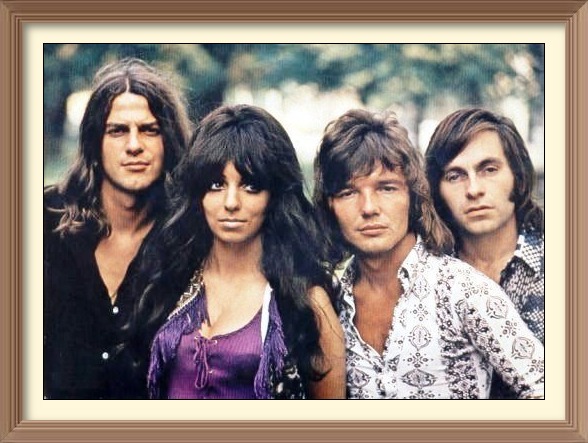
Shocking Blue
I was knocked out, so were some of the boys, and I said, "I think that could be a smash in England".
So I made contact with the group's manager and he told me that he record company had tried to place the record in England and that no one was interested.
They actually wanted a large advance, which I told them I could not give, but I said, "Give me the record and give me three weeks and I'll guarantee you a release". I was, of course, talking on behalf of the label as well as the publishing company, and when I came back with the record and played it to Larry, he just said, "It's a smash; we've got to have it,,.
We did get it, and it was a smash. (It reached No.8 in early 1970). We could have picked it up for America too, but unfortunately Larry did not have an outlet in America at the time - he was still negotiating a record deal in the US, so we missed out on what was to be a No. I in the States. But it was still great for me; it was only the second release for Larry on what was a new independent record label, and I'd only been with him for a week.
Did you have much trouble making it a hit?
We had a lot of trouble with the BBC at first; I suppose they thought "Who needs a Dutch record?" In the end, Larry and I went in there together and in fact we collared Tony Blackburn in the corridor, and said, "We're up here promoting a record called Venus", and he said "I'm not sure if I've heard that".
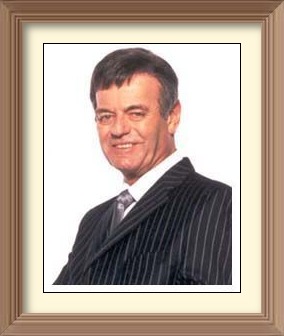
Tony Blackburn
So we all went back to his producer's office and the guy said, "Yeah, we played it once Anyway, they put it on in the office, and Tony listened to a few bars of it and said, "Fine - stick it in the programme for the rest of the week". This was on a Tuesday, and that's really how it started.
You would only have got the publishing rights to a foreign copyright like "Venus" for a limited period presumably?
In those days, you would usually get the rights for three years with an option for two more one-year periods if you got a cover in your territory. But in this case I guaranteed them a release in England, and we had a clause added saying that if the record went into the chart in England, we'd have the publishing for a further two years.
Another big hit from your Larry Page days was "Beautiful Sunday". Can you remember hearing it for the first time?
The two writers, Daniel Boone and Rod McQueen, had been signed to us for some time, and one morning they came into my office saying "We've written this great song". And I said, "Sure, fine sit down and have a cup of tea". And they said, "No - really, we've got to play you this song".
So I buzzed Larry and he said, "I'm coming up". Now we used to have a little room with a piano in it, and it really was little. The four of us went into this room and it was crowded. And Daniel Boone sat down at the piano and started thumping out this tune, and they both sang, although some of the lyrics weren't finished, and Larry was just standing there, and when it was finished, he said, "That's a hit, I'm going to record that next week".
And he turned to me, and I said, "Yeah, I think it's a smash". And I really did; it was the excitement of the whole thing. We were in a tiny confined space; Daniel was really banging away at the piano; they were singing out really loud; you could tell it, you could feel it, the little hairs on the back of your neck were standing out.
And there was the speed of the whole thing; we'd heard it one week and it was recorded the following week. Then Larry decided to rush it out.
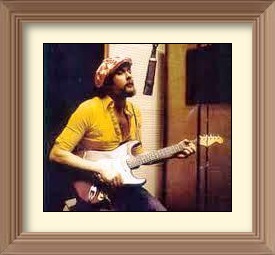
Peter Lee Stirling
AKA Daniel Boone
You also pulled off quite a coup by signing theThe Jimmy Webb catalogue while with Larry. How did you manage that?
I was told that his catalogue was going to be available for the UK and given the phone number of his American attorney Jerry Rubenstein. So I called Jerry one evening, and he was already dealing with a lot of very big publishers, and he said, "What have you got to offer?"
And I said, "I can' t offer you an advance because we re a small outfit, but I guarantee you a lot of hard work." And I also said, "I know you're coming to London -please meet me." And we did meet: Jerry, one of Jimmy's right hand men, myself, and Larry all went to lunch, and it was one of those things; all four of us "clicked" immediately, and we got on great. And afterwards, Larry said to me, "If you get the Jim Webb catalogue, it will be a great feather in your cap".
Now English people can sometimes be very cold to visitors; so I just said to Rubenstein, "If there's anything you want or anything I can do for you while you're here, please let me know". And there were a few things, like getting theatre tickets, which was no problem. And then he came to the office, had a look around and met everybody and said, "I'm very interested".
But I knew ATV Music had offered quite a good deal, so we just didn't know. Anyway, I got a phone call several days later from America, and Jerry said, "OK, we'll do a deal". He also said, "I look after a band called Poco, I'll give them to you as well. And if you do a good job on Jimmy's main catalogue, I'll put you in touch with the people who have another catalogue of his called Canopy Music".

Jimmy Webb
Well I really did work very hard on Jimmy, and I got Canopy Music, and that reminds me. When I first joined. Larry, he told me that his publishing company was going to be called Page Full Of Hits. And at first, I used to be very embarrassed about that name. I'd phone up someone and say, "Hello, Terry Noon here at Page Full Of Hits", and they used to laugh, and say, "What hits have you had?" and I'd have to say, "None yet". But within two years of setting up the company, Larry was actually able to take a page advert in "Music Wee" and we literally had a page full of hit songs to list in that ad, a lot of them Jimmy Webb's of course, which was marvellous.
Did you meet Jimmy?
Jimmy came to England to do a concert at the Albert Hall, so I met him at the airport, travelled with him back to London, where I'd arranged a suite for him at the Inn On The Park, which had to have a grand piano for him, and I found him fantastic. Very shy, very quiet.
At that time, he was going through a hippie stage and it was also difficult to place some of his songs at that time.
But then I'd get Andrew Oldham (the first manager of the Rolling Stones) phoning up and saying, "I love these songs of Jimmy's you've sent me, I'm going to record a couple".
And Jimmy was knocked out with that. He also did a TV show which he wasn't all that sure about, but the BBC wanted it, an "Evening With Jimmy Webb" type of thing, and Warner Brothers, for whom he recorded wanted it, and through Jerry, I'd persuaded them that it would be great idea.
Your deal for the Webb catalogue wasn't just an administration deal then?
Definitely not. It was a case of promoting Jimmy Webb's material and, when he came over here, promoting Jimmy Webb. Mind you our percentage wasn't much, because we weren't paying money up front, and we were unknown to the American people.
But although we worked very hard on Jimmy for a fairly low percentage, we were enhancing both my reputation, and the publishing company's reputation, plus Larry and I were able to go to America, and meet very important managers, producers, people like that, through the Rubenstein connection.
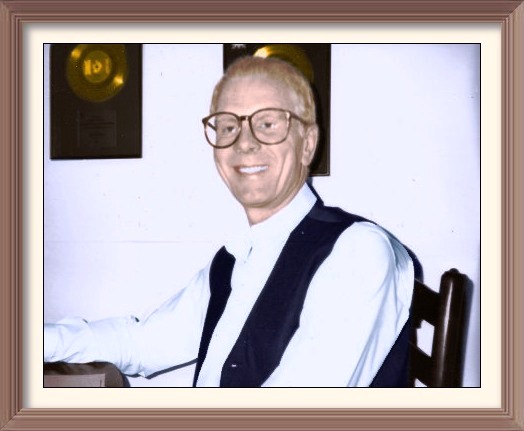
And that's how we managed to break into the American wheeler dealer type thing. We did this "terribly English" act when we went to the States, Larry and I; we both wore dark glasses and we set up a bit of an image, which the Americans love. So we were able to get "Beautiful Sunday" happening over there, (it went Top 20), and the Fortunes were having their second run of success there, and we also had the "B" side of "Storm In A Teacup" which was a very big American hit, through a deal I'd done with them; and all these nice things were happening basically because of our Jimmy Webb deal, really.
Why, with all this success, did you leave Larry after four years?
Working for other people, I'd either found certain copyrights that were successful, or found an act that became successful, which generated a lot of income.
Now I was being paid a wage, which I am in no way saying is wrong, but I was paying my way, and I thought, "This is fine, but if I really want to make my own decisions or do things a different way, I should stand up and be counted and do my own thing".
And that was really the gist of it. And I remember leaving Larry and having two incredible offers coming through immediately it was announced in the press, which really threw me. I honestly didn't know that anyone thought I was that worthwhile. And I thought, "Shall I take the money?"
But I decided not to. If you have got a lot of self-drive,.then you've just got to try your own thing or else you're always going to look back and say, "I should have tried it". So I decided to have a go.
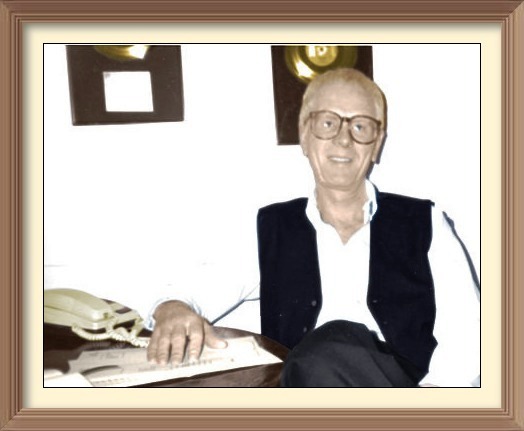
Did you start Noon Music with your own money, or with a bank loan?
When I left Larry, I was going through a hard time. My marriage had just broken up. I'd left my wife the house and everything in it, and I'd moved to a horrible little flat in Fulham that somebody else had arranged for me. The only thing I had was an E-type Jaguar, which was my pride and joy. I absolutely doted on that car, and I sold it, to start Noon Music. It was the hardest thing I'd ever done, but it was the only way I could raise money.
And April Music (the publishing arm of CBS Records), were one of the companies who offered me a job. They said, "We're not even going to talk wages; tell us what you want and we'll give it to you".
Now, if you can imagine, I'm in a little one-room flat in Fulham, the worst place I've ever lived in, with no carpets, no nothing, just about to sell the most prized possession I'd ever had, and they were saying, "Write your own cheque".
But it wasn't really a difficult decision to make.
No, I had no financial backing, and I never have had, in my whole career.
Did you consider buying a catalogue as a base?
I had to keep to a strict rule that I don't spend too much money buying catalogues or copyrights.
I've only succumbed a couple of times, and on both occasions I've lost money. I would much sooner find a writer and put money into developing that writer.
Did you know where you were going to get songs from?
I had a Pete Dello song called "Working Class Man" which we'd demoed, and in fact the second song I signed was a big hit, "Beach Baby". I'd been in operation a few months and I met the writer John Carter at MIDEM, and I knew John from my Larry Page days, and he said, "I've got a master. If you're interested perhaps we can do a deal".
So we went off and played it, and it was "Beach Baby", which I thought was fantastic, and there and then on a handshake, we struck up a 50-50 company, John Carter Music. Jonathan King took up the record and made it is own crusade, as Jonathan does (it was issued on King's own UK Records label in England), and I placed it with all the other companies around the world, and we had a fantastic hit with it all over. (It was a big English hit in 1974 and a massive international hit, reaching No 3 in America).
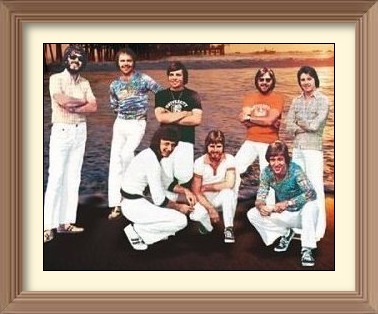
First Class
Later, John said, "If we can get any covers, get them" because although we had a group called First Class, it was in fact a studio band led by John, and so it was more or less a one off situation. And I was very lucky. I went to Paris and fell in with a publisher there who was looking for product for Sacha Distel. And I played him "Beach Baby" and he said, "Sacha will do this, and it will be a smash". I thought, "I can't quite see Sacha doing this", but I didn't say so, and it was a smash, and sold 400,000 copies in France.
Your next big success was George Baker's song "Una Paloma Blanca" from Holland, How did you come across it?
The first thing I heard of George Baker was via my connection with Shocking Blue. Their record company in Holland, Dureco, sent over something by him after we'd had "Venus". The band was then called George Baker's Tea Set, or just the Tea Set, and I think Larry had put something out by them.
But it wasn't very good, and nothing happened. Now by the time I'd started on my own, I was already making periodic visits to Holland, and on one of them, someone played me the original version by Baker. I then rang EMI Music over there and said, "I've heard 'Paloma Blanca' and I think it's fantastic"; and they said, "Well, we can't get any action at all in England, nobody's interested". So they let me have the publishing for the UK, where Warner Brothers had the record.
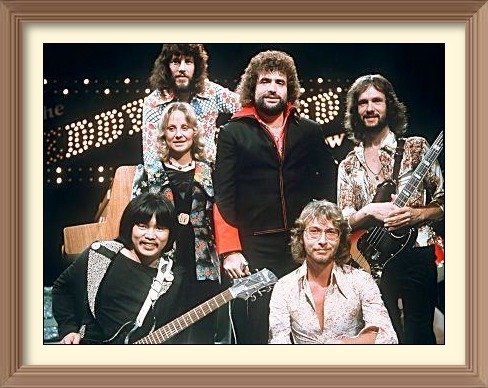
George Baker Selection
I remember flying home, getting off the plane at Heathrow at lunchtime, and going to my office which was then in Maddox Street, where a few publishing friends of mine were waiting to see me. I can remember every moment of this so clearly.
I came in, I was really excited. I put "Paloma" on, and said, "Listen to this, this is a smash". And they all rolled about laughing, they couldn't believe it. "You're mad", they said. "That won't do a thing here". Now I won't tell you who they were because they're quite well known.
But I thought to myself, "Crikey, are my ears going?" And I got a phone call from a guy called Theo Roos, who worked for EMI in Holland -he was the International Manager, and he said he was responsible for making that record a hit all over the world, and he added, "I'm going to be on your back every day until that record is in the UK charts".
However, nobody wanted to know. I remember Warner Brothers hated it and at times, I used to think, "They're right. Perhaps it isn't a hit. Perhaps I'm the only one who thinks it is".
But then, Theo would call again, and tell me it was big in Holland, it was No. I in Germany, or something like that, and I'd start thinking, "Perhaps I'm right after all".
I worked so hard on it, but in the end, I simply didn't know what else to do. Anyway, I called Jonathan King. I told him, "I've got this song called 'Una Paloma Blanca"', and he said, "Oh yeah, I know it, I tried to pick it up myself". And I. said, "Really? Well why don't you record it?". All he said was, "You must be joking. It's just not me, it's not Jonathan King". And I went over to see him, pleading; "Jonathan, it's a hit song. Please record it". And finally he said, "OK, but I'm doing an album, and I will only put it on the album".
After he'd done it, he called me and said, "We might have something here. How is the George Baker record going?" and I said, "It's not. Nobody wants to know", and of course, by now, it had been out six weeks. So Jonathan said, "OK, we'll go with it".
So Radio Two started to play it, I got Thames Valley, Radio 210 to go with it for a couple of weeks after hustling them like crazy, and Jonathan, being Jonathan, started to get a lot of airplay, and it all began to happen. Warner Brothers said, "Wait a minute. We've got the original".
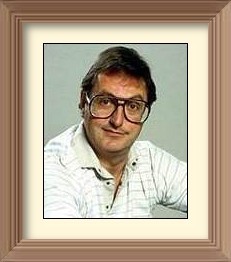
Jonathan King
This guy Theo was calling everybody, and I ended up with both versions in the Top 5. Then Bob Barratt called me up from EMI and said, "We want to do a parody on this with The Wurzels", and they'd just come off a Number One. That's how it flowed for me in 1975, and even when I went over to Holland to thank everybody for "Paloma", I found "Mississippi"!
That song was by the Dutch group Pussycat. What did you think when you first heard it? Did you think you had another "Paloma Blanca"?
Well that's what Theo told me! I was in Hplland to thank everyone, when he called me into his office, and said, "I'm going to play you a record, and I want you to have the publishing. You may have some difficulty with it, it's another Paloma Blanca I'm afraid". And I said, "Theo, you couldn't give me another Paloma Blanca if you tried".
Anyway, he played it to me, and I listened to it, and I thought, "That's a great hook, and by the time he played it to me, it was already starting to happen in Holland in a big way, and was starting to take off in Germany, so I thought, "This man was right before, the song has hit me in the same way, so I'm going to go with it. I don't care if I have the same problems as with Paloma". This time, he told me that he'd done a deal for the record with Rod Buckle at Sonet in the UK.
I knew Rod from a long time back, and so I knew I had an ally this time.
Nevertheless, we had the same problems again. So again, I called Jonathan King, and said, "Jonathan, you won't believe this", and he said, "Don't tell me, you've got another hit song for me", and I said, "I have, and it's a smash, I've had it out for ages, and it's called 'Mississippi' and he said, "I've heard it. You're right, I'll do it".
So again, he recorded it, and it went straight into the charts, but this time, there was a big thing about the record being hyped, which I know it wasn't, but Jonathan promptly withdrew his record within ten days of it being released, and the Pussycat version went to Number One.
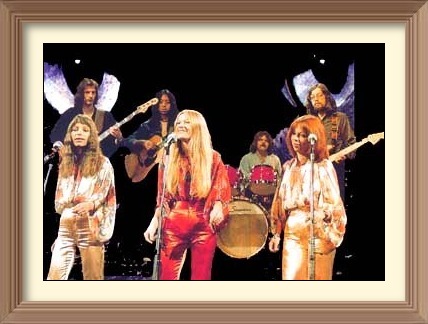
Pussycat
I know Jonathan put a lot of records into the shops, and I think what happened is that somebody suspected that some customers were saying, "Can I have Mississippi?" and no one was sure whether they wanted the Pussycat version or the Jonathan King version.
Anyway, although it was still a big hit for me, it upset Jonathan, and rightly so, because I know myself that he would have taken it to Number One.
Are you still publishing "Paloma" and "Mississippi" now?
Very much so. Paloma is still drawing in income, which is fantastic. It is on several albums and this year. is going to be on the new Typhoo Tea advert on television, which is going to regenerate a lot of interest in it. It's like "Beautiful Sunday", it's very simple, or like "Mississippi" which is also a very simple song with a great hook. Every now and then, those songs come up, and when they do, they're big hits, and you can't knock songs like that. Around 1975 and 1976, they flowed for me, one after another. Mind you it was hard work. Many people thought Paloma could not make it, and when it did, quite a few important people told me "You've done it with Paloma but you're wrong about Mississippi", but I had that feeling again.
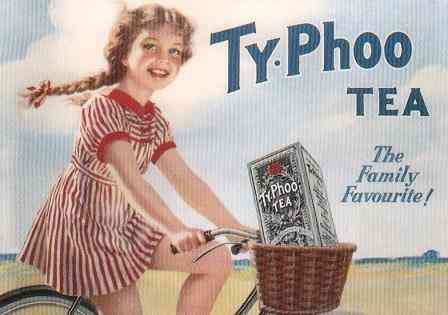
Funnily enough, I was in Germany in 1982 doing a TV show and somebody played me a really rough cassette of a song, and I just knew it would be a smash. The song was "Da Da Da" by Trio. I could not get the publishing but in fact, I recorded it here with an English guy and we got it into the breakers, but then the Trio version came out and everybody played that, and our version lost out.
Soon after, you became MD at Arlon Music?
Well it must have been very shortly after we met that I was approached by Deke Arlon. He wanted me to become Managing Director of Arlon Music, his music publishing company. Deke had been very successful in publishing but he was very much into management - he managed Sheena Easton, Dennis Waterman, Gerard Kenny and Chris Neil, the record producer - and he wanted to concentrate more on that side and also the theatrical side, he wanted to become a producer in the theatre. So he was looking for someone to come in and handle the publishing. I thought seriously about it and the only thing was, Deke operated out of Amersham - he had a country house there - and I said to him, "I will become MD of Arlon Music providing I can have an office in London. I don't think being out in the country is really right for the growth of the company".
And he said, "Fine, find an office". So after a lot of searching, I was in Marble Arch and I bumped into an old friend, David Howells, and we started talking. I said, "I'm out looking for an office", and he said, "Well I'm just leaving one! Come up and have a look at it". He was going into business with Pete Waterman - and we all know what happened with that! (Howells became MD of Waterman's phenomenally successful PWL label). Anyway, I went to the office, in Connaught Street, and it was fantastic. So I had Deke come down and look at it and he said, "If this is what you want, let's go for it".
My agreement with Deke was that I would not sign anything new to Noon Music but I would be allowed to carry on looking after the copyrights that were already successful, like "Paloma Blanca" and ''Mississippi and one or two other things I'd been working on. I had something like 350 copyrights, though a lot of them weren't active at the time. But I didn't want to forget Noon Music. It wasn't a healthy turnover, but it was a turnover and with that agreement, I decided to join Arlon.
I walked in there and within two weeks we had the announcement of the Eurovision and we had two songs in the last eight, so that gave me something to do! One of them, we didn't have an artist for and I convinced Alvin Stardust's manager that Alvin should do it, which he did. Unfortunately, neither of the songs won. A few weeks later, Gerard Kenny composed the theme for a TV series called "Widows", I placed the recording with Warner Brothers and the record became a chart success, Top 40. In fact, we had so much success in the first eight months I was there, Deke moved all his staff from Amersham into London and we took over the rest of the building, which was three floors.
When I had that chart record with him, I wanted him to immediately follow that up and so did Warner Brothers.

Gerard Kenny
But Gerard had become involved with Alan Jay Lerner (the legendary lyricist of "My Fair Lady", "Brigadoon", "Paint Your Wagon", "Gigi", "Camelot" etc.) on a show called "My Man Godfrey" and he felt he should put everything into that. I said to Gerard, "please take some time out to write a new song. If you have another hit record, it can only help the show". But he didn't quite see it that way. And unfortunately, at the end of the day, after a lot of time and effort, the show came to nothing. Shortly afterwards, Alan passed away.
Did you get to meet Alan?
I met him once. Gerard brought him up to the office to meet me and it was quite an experience. You think, "I'm meeting a legend here!" A very, very nice man. And Gerard also brought Clive James in to see me, because they did some writing together, which was a nice gesture on Gerard's behalf. I think it was because I tried to make our writers feel the office was part of their home, a place they could always come. And so they'd say to people, "come and meet my publisher!"
How did you get to know Chris Neil?
I looked after his publishing. First he had C & D Music, which he owned with Deke Arlon, and then he formed another publishing company called 63 Songs, which was actually his own company. Chris had quite a few things happening, one of which was getting involved with Mike & The Mechanics and he wrote with Mike Rutherford (leader of the band and also a part-time member of Genesis, of course), so I had half of Mike & The Mechanics' publishing. Chris put his share into 63 Songs.
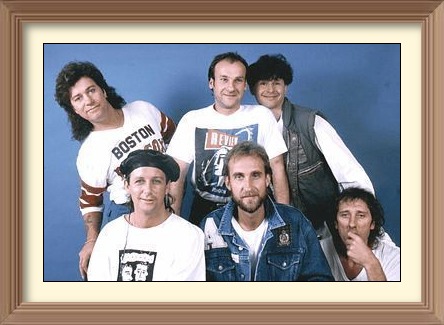
Mike & The Mechanics
In 1986, Chris Neil and I went to Los Angeles to pick up an ASCAP award for "All I Need Is A Miracle" being the most played international song on American radio. I also received an award from ASCAP in London on behalf of 63 Songs, again for the success of Mike & The Mechanics, so 85/86 was a very active period. We were building a very strong independent publishing company. At one period around then, we had 16 copyrights on the American charts - some singles and some album tracks. And looking back, I'd say the climax of the Arlon thing for me was Chris Neil and I going to America to pick up that award.
Though we looked after ourselves in the UK, we sub-published through Chappell internationally and what I used to do was have a relationship with the individual countries directly I didn't just go through the London office. I contacted people directly and sent them material directly so they felt more like an offshoot of our office. And it wasn't a hustle I was just making them aware of what we had, giving them a full outline of what the writer was about and keeping them up to date with all the new product. Not just sending them what had been recorded, but new demos, new ideas, keeping them well ahead of the game.
Mick Leeson & Peter Vale?
Mick Leeson and Peter Vale, had been schoolteachers, though when I was involved, they were already full-time songwriters, we'd paid them an advance and some of the copyrights I've mentioned that we had in the American charts were by them. They'd written for Sheena and for a few other people, and Mick Leeson had written several lyrics for other people's tunes. For instance, the "Widows" theme, for which Gerard Kenny did the music. They were very bright boys and real craftsmen. All they wanted to do was write songs. They didn't really want to perform, although they had a slight interest in producing. But mainly it was writing and they went about it very professionally. They would meet at nine o'clock in the morning and finish some time in the afternoon just like a job.
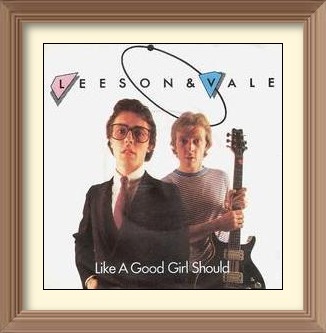
Mick Leeson & Peter Vale
Did you seek out new talent yourself?
I made it a policy that I would hear everything that came in because although I had people working for me, I felt I should be seen to be involved. Deke was employing me for my experience in the business, not just to sit there while other people found the talent. And I must say he gave me total control - it was like running my own show.
Deke was managing Ned Sherrin and we put on a musical called "The Sloane Ranger", which Ned did with, I think, Keith Waterhouse, which was very successful and Ned also did a version of "The Mikado" - very much a Ken Livingstone era "Mikado"! and I represented the publishing on that, because there were original songs in it. I hadn't been involved in putting on a musical before and that was quite an enlightening time for me.
All our administration went through Frank Coachworth at Mautoglade which was excellent because Frank is very experienced and a very nice man. So if I had any problem, I'd go round to Frank and we'd sort it out. I found that a lot more valuable than having somebody sit in front of a computer. With a one-man operation like Noon Music - well, one man and a secretary! - you become cocooned in what you're doing. When you suddenly join an organisation like the Arlon Group, although it was a small company compared to a Chappell or an EMI Music, there were people operating in different fields that you could bring together and that gave me a lot more room to manoeuvre.
Deke would never stop me getting involved with the management side or going with him to a record company to discuss an artist, so I'd meet more people, more opportunities would arise and that made it a lot easier for me.
And then came The Really Useful Group!
Well, when I started with Deke, one of the other directors there was a chap called Derek Everett, who I'd known for many, many years and built up a good working relationship with. But Derek left the Arlon Group to set up Really Useful Records (the record wing of Andrew Lloyd Webber's Really Useful organisation) and he approached me a couple of times, saying, "I would love you to come and join me". At first, I took it more as a piece of flattery but he became very insistent, saying, "It really could be a great move for you".
Well I had to think long and hard about leaving, but in the end, Derek and Brian Brolly (MD of the whole RU group) made me an offer which it would have been silly to refuse. My only reluctance about it was going away from publishing and just getting into the recording side, because Really Useful already had a publishing company and I wasn't going to be involved in that at all. But I decided to go and that was at the beginning of 1989.

Andrew Lloyd Webber
I didn't meet Andrew Lloyd Webber until I'd been there about five months actually. He came over at the end of a board meeting and had a few words with me - he was very, very nice. I should point out that the time I was there, he was mainly in America and France, and anyway, I used to report to Brian Brolly - my main involvement was with him. I met Prince Edward, too! He started on the same day as me and I met him in a corridor! He said, "Hello, I'm Edward!"
Then, we had a memo saying that during office hours we could call him Edward but on any engagements outside office hours, we had to address him according to protocol. He was very, very pleasant and very keen to learn about the theatre.
Why did you leave Really Useful?
The reason I only stayed for twelve months was that when Brian Brolly resigned, it was made very clear to me that I could only become involved with product directly associated with Andrew - they didn't want anything from the outside.
And that's not what I was told I was going to be doing and not what Derek Everett thought we would be doing when we started.
I thought it would be a straightforward record label, mainly going for product that you could associate with the Group - we wouldn't be signing any heavy rock bands - but we would be doing albums with well known singers, things like that, keeping it slightly MOR, I would say, but very high quality, maybe doing some of Andrew's songs, maybe not.
Derek and I put together "The Premier Collection" album (a compilation of the best recordings of Webber, songs) which got to Number 2 in the charts, and that wasn't as easy as it sounds.
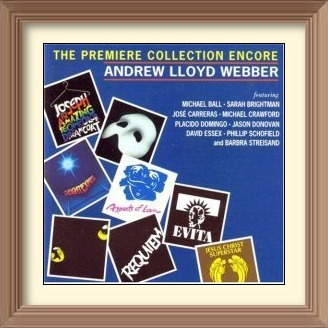
There were quite a few masters (tapes) with different labels who weren't that keen to lease the rights to us, so we had to work very hard on that. We also launched Michael Ball's career with "Love Changes Everything". I signed Simon May and we did an album with the Simon May Orchestra. He also did the ITV theme for the Olympic Games, which we put out as a single.
Unfortunately, none of us realised at the time that the transmission from Tokyo would be going out from around two o'clock to six o'clock in the morning! So we didn't get a very big TV audience!
We also put out a single with Simon that I thought was going to do much more than it did. It was called "Glory Be" and it was the "Eastenders" theme (co-composed by May) with special lyrics by Simon and done with a school choir.
We put it out just before Christmas, it got a lot of air-play and a lot of people tipped it to be the Christmas hit. But Cliff came in with ... I think it was "Mistletoe And Wine" that year ... and ours just didn't take off.
But my time at Really Useful was not a happy one. You know, during the whole of that time we were putting a new label on the map, as it were, I never once got a note saying, "Well done!". I felt that Derek and I were working very hard and I just felt there was no recognition there. I just didn't feel at home and I left in January 1990.
What was your next move?
I took a few months to decide what I was going to do and my decision was to carry on with Noon Music and sign some new talent.
Within a couple of months, I was introduced to a singer-songwriter who I thought was absolutely amazing.
I'm not going to mention names but I had so much faith in this person becoming a major recording artist, I said, "I would like to sign you but to show you just how strong I feel about you, I'll work with you now for the next few weeks, produce some demos and I'll guarantee you a recording contract.
Anyway, we did some demos, I played them to a couple of record companies and the response was as good as I expected.
So I rang the writer and said, "I'm sending you a publishing contract and in it, I will say that within three months of signing you, I will get you a recording deal - terms acceptable to you". So I sent off the contract and I then get a phone call from a lawyer, saying to me, "I now represent this songwriter and I want to make a few changes to your contract, one of them being the advance". He said, "If this writer's got a recording contract, I can get a much bigger deal from a major publisher!"
I said, "I don't think you quite understand - it's been my hard work, my enthusiasm that has got this deal". He said, "That doesn't matter - I'm thinking of my client. All I know is, this artist has got a recording deal, you're offering 'x' amount and I can get five times that". So I said, "Well you will have to get it from somebody else". I was really choked about that because I'd worked quite hard and I honestly believed this person was ready for international stardom.
Shortly afterwards, I met a manager who had a band and again, I was very impressed with a couple of the songs. So I met the band, met the songwriters, got on very well with them, gave them a lot of time and advice, and they seemed very enthused.
Then I get the same thing from the manager - "How much will you offer? I've been to so-and-so and they've said 'If you can get a recording deal, we'll offer you this amount'." And I thought, "Either I'm getting very naive or the business is becoming very hard". It's no longer "What can you do? Your experience is valuable" - it's, "How much will you give us?" So again I backed off.
I thought the best thing for me to do was go back into the catalogue, see what I could do with my existing copyrights. I owned the Honeybus masters and also quite a bit of the publishing of old Honeybus material and during the next few months I got "Maggie" released on the continent on four different compilation albums, one of them TV-advertised. Then back here, Colin Miles of See For Miles Records (a leading independent reissue label) released a Honeybus album, a Pete Dello (leader of Honeybus) album and a Colin Hare (member of Honeybus) album, and it was wonderful, dealing with all these professional people again!
So that's the sort of thing I've been doing, just ticking over. I wish I could say to you that I've found the new Beatles, though I'm sure that they're out there. I'm sure a band with two or three talented writers, who aren't using computerised machinery are going to come through and really shake the business. I think the industry is waiting for something like that.
I do know what they're not going to sound like! Watching "Top Of The Pops", I see one guy screaming six words into a mike that constitutes a lyric, two guys thumping away at keyboards, a track that's obviously been made in a sitting room somewhere, and five people dancing! I'm not knocking dance music but those acts don't go out on tour, don't learn their craft, don't build a following and I might be wrong in saying this, but I don't think they happen overseas.
So you're getting something that may clear your initial investment but you're not building an artist, you're not building a future. I do worry about the future because if there aren't guys out there learning the piano, learning the guitar, learning to play the clubs, there's going to be a gap in the next generation where good music won't come through because nobody knows how to play. But having said that, I'm sure there must be some young guys out there who are going the route that Lennon & McCartney took. that Gordon Sumner (Sting) took, and that quality is going to come through. We as an industry have got to make sure we don't neglect that side and that we realise there's a much bigger record-buying public out there than this dance thing.
There's a lot of people out there will buy that type of music if they're given it. A lot of people still like to whistle or hum the tune and hear a lyric they can relate to. If that's MOR, I don't care and if people in A & R Departments think that's old hat, I'm sorry. The whole foundation of what we're talking about is a good song. It really is down to the songwriter and it's down to the industry to maybe set the new trend, which is quality, and I would love to be part of it if I could find the act.
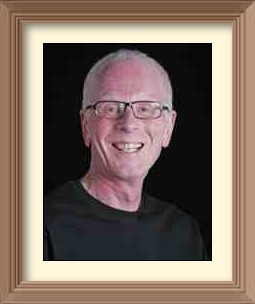
Advances seem to be a huge factor nowadays.
That's a major problem. I go back to the 70s and 80s when there were a lot of publishers like me around, looking for talent, looking for songwriters - maybe twenty or thirty of us with our own companies, taking talent to record companies. What's happened now is, because people come in and say, "We want 'x' amount", we small entrepreneurs have started disappearing - perhaps giving up, perhaps joining other companies - so there's far less guys out there hustling, looking for talent. There's nothing wrong with signing to a major but they can only handle so much. The only thing I can do, I think, is go on trying to convince people that experience and enthusiasm can make up for paying somebody.
Is there still a role for the non performing songwriter?
I think at the moment that that is a very difficult area, although I still believe that a good song will come through. The thing is that although there are lots of artists that do rely on other people's material, it's becoming more difficult to get to them - you have to go through so many people who think they know what's best for their artist. Of course the old days of going to an A & R Man's office and playing him five or six songs are long gone. But don't let me appear negative; if the song is good enough, a good publisher should be able to place it.
Copyright Songwriter Magazine, International Songwriters Association & Gerald Mahlowe: All Rights Reserved
Postscript
Since 1967, we have spoken with hundreds of songwriters and music publishers, building up a huge collection of detailed interviews which is unmatched anywhere.
Click
HERE to see a list of those currently on this website. And remember, we add new ones every month!
The Main Menu

ISA • International Songwriters Association (1967)
internationalsongwriters@gmail.com
The Small Print
This International Songwriters Association 1967 site is a non-profit non-commercial re-creation of portions of the full site originally published by the International Songwriters Association Limited, and will introduce you to the world of songwriting. It will explain music business terms and help you understand the business concepts that you should be familiar with, thus enabling you to ask more pertinent questions when you meet with your accountant/CPA or solicitor/lawyer.
However, although this website includes general information about legal issues and legal developments as well as accounting issues and accounting developments, it is not meant to be a replacement for professional advice. Such materials are for informational purposes only and may not reflect the most current legal/accounting developments.
Every effort has been made to make this site as complete and as accurate as possible, but no warranty or fitness is implied. The information provided is on an "as is" basis and the author(s) and the publisher shall have neither liability nor responsibility to any person or entity with respect to any loss or damages arising from the information contained on this site. No steps should be taken without first seeking competent legal and/or accounting advice
Some pictures on this site are library images supplied by (amongst others) the ISA International Songwriters Association (1967), International Songwriters Association Limited, Dreamstime Library Inc, BMI (Broadcast Music Inc), ASCAP (American Society Of Songwriters, Authors and Publishers), PRS (Performing Rights Society), PPS (Professional Photographic Services), RTE (Radio Telefis Eireann) TV3, and various Public Relations organisations. Other pictures have been supplied by the songwriters, performers, or music business executives interviewed or mentioned throughout this website, while certain pictures are commercial stock footage of businesses and office environments generally, rather than specific images of the ISA, its personnel, facilities or members.
In any event, all images are and remain the property of the individual owners unless indicated to the contrary.
Home •
Interviews •
Writing A Song
|